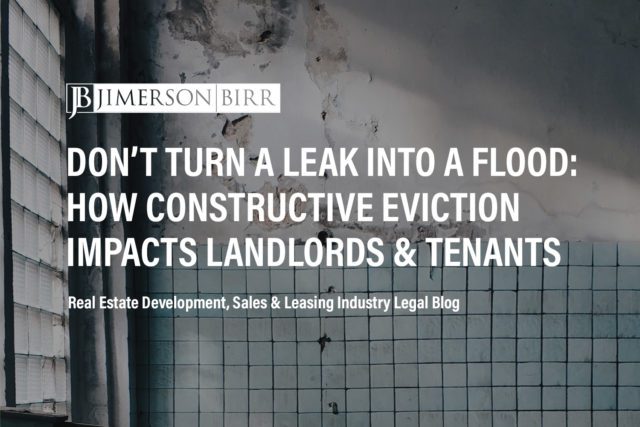What are constructive evictions?
Constructive evictions occur when a commercial tenant is forced to vacate a rented property due to the landlord’s failure to maintain the premises in a habitable condition. In Florida, the concept of constructive eviction is grounded in the legal principle of the implied warranty of fitness for a particular purpose. This warranty obligates the landlord to keep the property safe and habitable for the tenant’s intended use.
For instance, if a landlord neglects to address issues like water leaks or mold growth, causing the tenant’s business to suffer, the tenant may claim constructive eviction. Under Florida law, a tenant asserting a constructive eviction claim must prove that the landlord’s breach of duty significantly interfered with the tenant’s use and enjoyment of the premises and that the tenant vacated the property within a reasonable time after the problem did not resolve.
Need a commercial leasing advocate? Schedule your consultation today with a top commercial landlord/tenant leasing attorney.
In Florida, which laws and regulations apply to constructive evictions?
In Florida, the primary source of law governing commercial landlord-tenant relationships and constructive evictions is Chapter 83 of the Florida Statutes, particularly Part I, which covers non-residential tenancies. Within Chapter 83, Section 83.51 delineates the landlord’s maintenance obligations, including the implied warranty of fitness discussed earlier. Although the statute does not explicitly mention constructive eviction, Florida courts have interpreted the statute to incorporate the doctrine. Moreover, local ordinances and building codes also play a role in determining the habitability standards that landlords must meet.
How do constructive evictions commonly lead to litigation between commercial landlords and tenants?
The following issues commonly lead to litigation:
- Failure to Maintain Premises: Constructive eviction often arises when a landlord fails to uphold their maintenance obligations as required by Section 83.51 of the Florida Statutes, causing the property to become uninhabitable for the tenant’s intended use.
- Breach of Quiet Enjoyment: Landlords must ensure tenants can use and enjoy their rented space without interference. Violating this duty, such as allowing excessive noise or not addressing disruptive neighboring tenants, can lead to constructive eviction claims.
- Withholding Essential Services: If a landlord deliberately withholds essential services like water, electricity, or heating, the tenant may have grounds for a constructive eviction claim under Florida law.
- Inadequate Security Measures: Landlords must provide reasonable security measures to protect tenants and their property. A failure to do so, such as not repairing broken locks or providing inadequate lighting in common areas, can lead to litigation based on constructive eviction.
When a set of facts is appropriate for legal intervention, there are many paths a claimant may take. We are value-based attorneys at Jimerson Birr, which means we look at each action with our clients from the point of view of costs and benefits while reducing liability. Then, based on our client’s objectives, we chart a path to seek appropriate remedies.
To determine whether your unique situation may necessitate litigation or another form of specialized advocacy, please contact our office to set up your initial consultation.
How should counsel for commercial landlords draft, review, and negotiate a lease that mitigates litigation risks?
Counsel should consider the following to protect their clients:
- Clearly Define Maintenance Responsibilities: The lease should clearly outline the responsibilities of both the landlord and tenant, referencing the requirements outlined in Section 83.51 of the Florida Statutes.
- Address Quiet Enjoyment: The lease should explicitly state the landlord’s duty to ensure the tenant’s right to quiet enjoyment and outline procedures for addressing any disturbances that may arise.
- Include Essential Services: Clearly define the essential services the landlord must provide, such as water, electricity, and heating. Also, establish procedures for resolving any service interruptions.
- Outline Security Measures: Specify the security measures the landlord must provide, such as lighting, locks, and surveillance systems, to ensure the safety of the tenant and their property.
- Dispute Resolution Clause: Include a dispute resolution clause outlining the steps to be taken in case of disagreements, such as mediation or arbitration, to potentially avoid costly litigation.
- Establish a Notice and Cure Period: Also include a provision that requires the tenant to provide written notice of any alleged breach, giving the landlord a reasonable opportunity to remedy the issue before the tenant may claim constructive eviction.
Please contact our office to set up your initial consultation to see what forms of intellectual property protection may be available for your unique situation.
Frequently Asked Questions
- What are the elements of constructive eviction?
The elements of constructive eviction are:
- The landlord must have done something to make the property uninhabitable.
- The tenant must have notified the landlord of the problem.
- The tenant must have allowed the landlord to fix the problem.
- The tenant must have actually moved out of the property.
- What are the remedies for constructive eviction?
The remedies for constructive eviction include:
- The tenant may be able to break their lease without penalty.
- The tenant may be able to sue the landlord for damages.
- The tenant may be able to recover the costs of moving.
- What are some examples of constructive eviction?
Some examples of constructive eviction include:
- The landlord fails to make repairs necessary to make the property habitable, such as repairs to a leaky roof or a broken furnace.
- The landlord engages in illegal or unreasonable behavior, such as drug dealing or prostitution.
- The landlord interferes with the tenant’s use of the property, such as by blocking the tenant’s access to the property or by making excessive noise.
Have more questions about how commercial leasing could impact your business?
Crucially, this overview of constructive evictions does not begin to cover all the laws implicated by this issue or the factors that may compel the application of such laws. Every case is unique, and the laws can produce different outcomes depending on the individual circumstances.
Jimerson Birr attorneys guide our clients to help make informed decisions while ensuring their rights are respected and protected. Our lawyers are highly trained and experienced in the nuances of the law, so they can accurately interpret statutes and case law and holistically prepare individuals or companies for their legal endeavors. Through this intense personal investment and advocacy, our lawyers will help resolve the issue’s complicated legal problems efficiently and effectively.
Having a Jimerson Birr attorney on your side means securing a team of seasoned, multi-dimensional, cross-functional legal professionals. Whether it is a transaction, an operational issue, a regulatory challenge, or a contested legal predicament that may require court intervention, we remain tireless advocates at every step. Being a value-added law firm means putting the client at the forefront of everything we do. We use our experience to help our clients navigate even the most complex problems and come out the other side triumphant.
If you want to understand your case, the merits of your claim or defense, potential monetary awards, or the amount of exposure you face, you should speak with a qualified Jimerson Birr lawyer. Our experienced team of attorneys is here to help. Call Jimerson Birr at (904) 389-0050 or use the contact form to schedule a consultation.

We live by our 7 Superior Service Commitments
- Conferring Client-Defined Value
- Efficient and Cost-Effective
- Accessibility
- Delivering an Experience While Delivering Results
- Meaningful and Enduring Partnership
- Exceptional Communication Based Upon Listening
- Accountability to Goals











